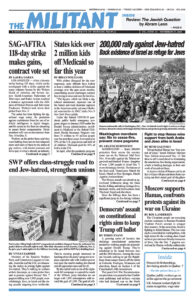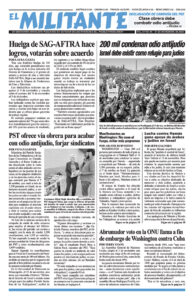MONTREAL — Some 420,000 public workers went on strike for the first time Nov. 6, demanding a new contract with the Quebec government. A majority of them are health and education workers united in a Common Front of four union federations. These are the Confederation of National Trade Unions (CSN), the Quebec Federation of Workers (FTQ), the Federation of Quebec Unions (CSQ) and the Alliance of Professional and Technical Personnel in health and social services (APTS).
The 80,000 members of the Interprofessional Health Federation of Quebec (FIQ) went on strike Nov. 8-9. The FIQ, which negotiates apart from the Common Front, largely organizes nurses.
Key issues in the negotiations are wages and working conditions. “We need wages that make it possible to keep your head above inflation,” Daniel Gagne told the Militant on the picket line in front of the Sacre-Coeur hospital Nov. 8. He is president of the Union of Health Care Professionals of the North of the Montreal Island, an FIQ affiliate. “The negotiations are going nowhere,” he said.
“Forced overtime is one of the most important things for us,” striker Lise Rivera said in front of the Jean-Talon hospital. “They need more personnel.”
Aurelie McBrearty, a nurse at the University Hospital Center of Montreal, told this Militant worker-correspondent that the government intends to raise the retirement age for nurses by two years. A nurse with 35 years of seniority can retire at 55 today.
On all the picket lines visited during the strikes, Militant supporters were struck by the widespread support strikers got from drivers passing by.
The Common Front announced it will go on strike again Nov. 21-23, and the FIQ Nov. 23-24. The Autonomous Education Federation (FAE), which organizes 65,500 primary and secondary teachers, is set to begin an unlimited strike Nov. 23.
All six union federations have rejected the Quebec government’s new proposal to increase wages from 9% to 10.3% over five years.


